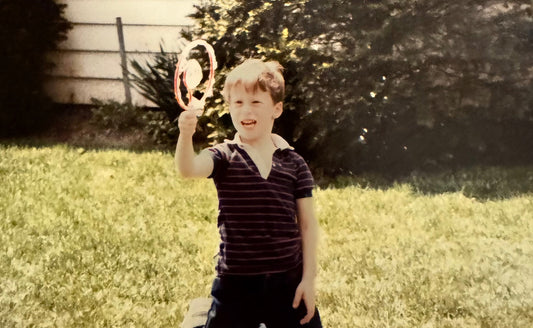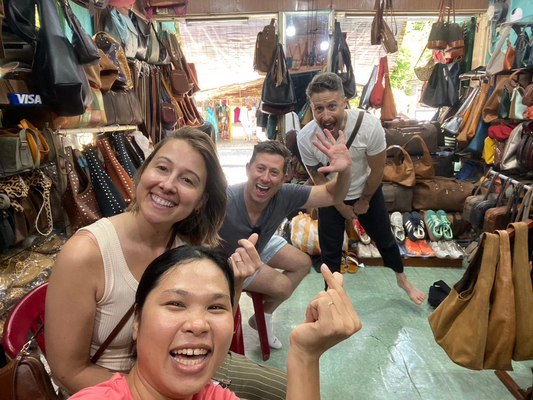
Toxic Coaching: When Help Becomes Control
When the Liver King scandal broke, most people were shocked that he lied. I wasn’t.
What struck me more about Untold: The Liver King documentary on Netflix was how eerily familiar the whole thing felt. Not because I’ve ever eaten raw liver or carried double my body weight across a pasture, but because I’ve been watching the coaching and wellness space drift toward that same kind of performance.
Rigid. Self-important. Addictive. Profitable. And, at its worst, cultish.
The Liver King, Brian Johnson (not to be mistaken for the world's most measured bio-hacker of the same name-different spelling-same crazy) claimed to live by nine "Ancestral Tenets" while selling organ supplements, performing grotesquely intense workouts, and portraying himself as the ultimate truth-teller.
The whole thing was built on a promise: you can be like me if you follow these rules.
But when the curtain pulled back and it turned out steroids were the real tenet behind the muscle, the internet went wild. Everyone had something to say. Especially the early critics who basked in the validation.
But the real question isn’t "Why did he lie?" The real question is: Why are we so easily sold?
The Problem Isn’t the Lie. It’s the Blueprint
We like to think these stories are outliers. One rogue influencer. One bad coach. One wellness cult gone too far. But there’s a pattern here. And once you see it, you can’t unsee it.
This is the blueprint:
- Take a high-performing individual with charisma and a personal mythology.
- Wrap them in certainty.
- Package their method into a system.
- Position that system as the only way.
- Sell belonging, then slowly remove your ability to leave without shame.
It’s not just the liver bros. It’s the ultra-optimized leadership coaches. The spiritual influencers. The high-performance hacks that tell you rest is for the weak and questioning is resistance.
And let’s be clear: some of these people aren’t malicious. Many, like Brian it turns out, are simply outrunning their childhood demons of abandonment, loneliness, and insecurity, while others are just running the same script someone sold them.
But intention doesn’t negate impact.
What Is Toxic Coaching?
Toxic coaching doesn’t always look abusive. It often looks like progress. It wears the language of breakthrough. Of resilience. Of growth. But underneath, it’s built on erosion. Of boundaries. Of intuition. Of choice.
Toxic coaching:
- Glorifies pain as the only teacher.
- Sells rigidity as discipline.
- Confuses exhaustion with commitment.
- Builds systems of dependence.
- Punishes change of heart.
- Equates questioning with failure.
It doesn’t matter whether it shows up in a gym, a Zoom room, or a desert retreat. If it asks you to suppress your gut in favor of someone else’s framework, that’s not growth.
That’s submission.
What Real Coaching Should Feel Like
I want to be transparent, even at the risk of an eye roll. I'm a coach and I coach people under pressure. Founders scaling fast. Leaders navigating high-stakes roles.
And I can tell you without an ounce of hesitation in my fingers, they don’t need hype. They don't need a self-important guru. And they certainly don't need a con-artist.
They need confidence. Ground. Agency over their choices.
So I’ll say this as simply as I can: Coaching shouldn’t make you doubt yourself more. It should help you trust yourself more.
Real coaching:
- Supports when it counts.
- Encourages independence when it matters more.
- Respects your rhythms.
- Asks better questions, not offers bigger answers.
The goal isn’t dependence. The goal is dignity. That's why I say exhaustively that real coaches coach you to outgrow them.
Admittedly, I have fewer peers in this industry as the toxicity—and my outspokenness about it—spreads. That shrinking circle doesn't necessarily feel good but it also doesn’t worry me.
If anything, it tells me I’m walking the right road.
Red Flags to Watch For
Here are a few lines I’ve heard that should make you pause:
- “If it’s not working, it’s because you’re resisting.”
- “This isn’t a program. It’s a lifestyle.”
- “If you’re uncomfortable, good. That means it’s working.”
- “You’ll never get there without accountability.”
- “This is the only system that actually works.”
There’s nothing inherently wrong with any one of these statements, so let’s not get lost in the nitpicking. But when you start to hear them all together repeated, reinforced, and unchallenged, a pattern emerges.
And that pattern isn’t about growth. It’s about control.
So if something makes you feel like questioning the method is disloyal or like stepping away would be a betrayal rather than a boundary, see if you can pay attention to that.
That’s not transformation. That’s conditioning.
The Work Isn’t to Expose the Con-Artist. It’s to Trust the Signal.
You don’t need another con-artist selling you another system that promises certainty if you just override your instincts one more time.
And you certainly don't need to give up on relationships, simple pleasures, or your own happiness in the pursuit of becoming your best self.
You need space to process and perhaps support that doesn’t ask you to become someone else to succeed.
You’re not broken. You’re just surrounded with noisy people.
So if you’ve ever felt like coaching wasn’t for you, maybe it’s not. That’s entirely possible and perfectly valid. But the idea that it’s because you can’t be coached? That’s a tactic.
One straight out of the wannabe cult leader playbook.
Maybe coaching hasn’t felt like it’s for you because you’ve never been met with the kind that leaves you more human, not more programmed. The kind that’s willing to say, “You know what? You’ve got this. You don’t need my program.
You don’t even need this book.”
And that, I’d argue, is the only kind worth investing in.
Written by Stephen Belenky





1 comment
“If it asks you to suppress your gut in favor of someone else’s framework, that’s not growth.
That’s submission.”
Bingo! This is spot on and not only exists in the coaching world. It’s definitely all about control.